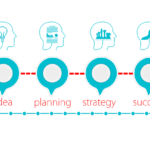Imagine that you are in your 20s. Everything is going well, and suddenly you get to know that you have motor neuron disease (ALS); something that may leave you completely paralyzed for your entire life. How would you react?
That will leave you shocked, mortified or even depressed.
This was what Stephen Hawking felt in 1963.
Today, Hawking is considered one of the greatest scientists to ever walk on the face of the earth. Widely known and often compared to scientists like Einstein and Tesla, Stephen Hawking has transformed our understanding of the universe for the better.
Birthdate of Stephen Hawking : 8 January 1942
Zodiac sign of Stephen Hawking : Capricorn
Hawking came to the limelight for his theories in the field of cosmology. His book A Brief History of Time appeared on The Sunday Times bestseller list for a record-breaking 237 weeks. The guy was able to make science cool for the public.
Now, that’s an achievement one can brag about.
Unfortunately, Stephen passed away on 14 March 2018 at the age of 76. He left behind a plethora of knowledge and a rich legacy to follow.
Table of Contents
Stephen Hawking’s formulas to success:
Don’t let your weakness dampen your growth
Stephen was 21-years old when he was diagnosed with ALS. He was told that he wouldn’t survive the deadly condition, as he had only 2 years to live. Everyone eventually lost hope and started mourning about his lost future. But for Stephen, it was like another shot at life. According to him, “Before my condition was diagnosed, I had been very bored with life, there had not seemed to be anything worth doing.”
When he realized that there was a deadline on his time on earth, he worked extra hard to give a new meaning to his life. He started working hard on his research and dedicated his time and energy to solving the mysteries of the universe.
Stay curious
Every great scientist is driven by his/her curiosity. And Stephen wasn’t an exception. He always emphasized questions like “why” and “how”. He wondered about the objects beyond our universe, and this curiosity of his led to some major discoveries.
Nothing is certain
Because of his disability, Stephen never took a day in his life for granted. He embraced everything-the good, the bad and the okay moments of his life-reasonably. He had once said, “The past, like the future, is indefinite and exists only as a spectrum of possibilities,” and he adopted these principles in daily life as well. Nothing that happens is certain. What might be logical today may be controversial tomorrow. So, go with your guts and embrace uncertainty.
Life is too short to not have a sense of humor
“Life would be tragic if it weren’t funny.”- Stephen Hawking.
I reckon everything can go wrong if the universe intends for it to go wrong. We can’t do anything about it. What we can do is, laugh away the sadness in our life. Hawking believes that we shouldn’t take ourselves too seriously. The day we do so, we start pitying ourselves. And that’s never a good sign when you are trying to pursue success.
Conclusion
The thing is, life is supposed to throw curveballs at you. The moment you stop dodging them and cry about it, you lose your fight against life. That is the moment you accept defeat. Stephen Hawking was great because of many reasons. A great scientist? Indeed. A great philosopher, No doubt. But more than anything, Stephen Hawking was a survivor. He couldn’t walk or talk. Hell, he couldn’t move a single inch of his body. But he managed to discover one of the greatest mysteries of mankind-the universe. For his unnerving spirit and dedication alone, Stephen Hawking is the true hero we all needed and lost. — concludes Business development expert Hirav Shah.
Image Source
Unknown author, Public domain, via Wikimedia Commons





















